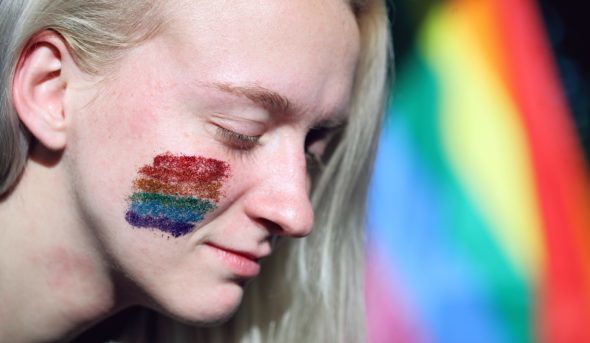
In this guest blog post, Gio, a leader in the New York Civil Liberties Union’s Teen Activist Project (TAP), shares her coming out story.
Before I came out for the first time, I thought it was something you did just once.
In my experience, people usually make assumptions about the pronouns people use and they also usually assume someone else is straight. If either your pronouns or your sexual orientation differ in any way from the norm, you will likely find yourself coming out on many different occasions.
So for myself and many other LGBTQ+ people I know, coming out is continual.
The journey thus far hasn’t been a straight road — pun intended. There isn’t a “Five Steps to Coming Out Successfully” guide. But, from my experience, I believe it’s important to come out to yourself first and be okay with your identity.
I’ve faced a lot of battles with internalized homophobia but once I confronted those feelings, I felt more comfortable in my own skin.
It’s also okay to not have your sexuality 100 percent figured out, and it’s okay if it changes over time. It’s important to remain true to yourself and surround yourself with a supportive community.
This is my story that I hope explains the advice I’ve offered above.
Going into eighth grade, I thought about sexuality a lot and what it meant to be straight. However, there was so much outside pressure to conform from family members, classmates, and the world around me that I dismissed my personal feelings and confusion.
I am straight, I told myself. I am normal.
Then I had the privilege of attending an all womxn’s sleepaway camp in Vermont for three summers. At this camp there were a lot of queer and gender non-conforming people, a community that I was particularly disconnected with at home. I distinctly remember asking one of my counselors who was queer, “When did you know you really liked girls?” They responded, “I just knew.” I felt even more confused about my sexuality but deep down knew that I wasn’t just straight.
When I got home from my last year of camp, going into 9th grade, I shaved one-quarter of the right side of my hair. Thinking back, I believe this is the first time I came out, in some sort of way.
Toward the end of my freshman year, I met a girl that changed everything for me.
Let’s call her Isa. From the moment I met Isa, we exchanged a different type of chemistry, and over the course of a couple months I started having feelings for her. I questioned these feelings and tried to find a justification that wasn’t admitting, “Oh yeah, I’m into girls.”
At one point I opened up to Isa about my feelings and she told me that she wasn’t sure about her sexuality either but would want to experiment. After we hooked up a few times, I was convinced that I wasn’t straight and desperately sought out a new label.
That summer was a turning point in my life. Although I didn’t 100 percent align with the term “bisexual,” I would tell my friends that was my sexuality. Even after I had “come out,” I would often find myself being doubtful. I didn’t know what exactly to call my sexuality because it felt so fluid. On some days, I felt as though I was a lesbian and that was it. And on others, I felt as though I was straight and that was it.
I became a volunteer at the Brooklyn Community Pride Center in September of my sophomore year. It became a safe haven for me to figure out my sexuality. Another volunteer once told me, “You don’t have to have everything perfectly figured out to know you’re part of this community.” I thought about this and thought of a way to express myself that wasn’t so definitive. I adopted the term “queer.” To me, being queer was about being a part of the LGBTQ+ community. I felt that I had to come out again, but now as queer.
This isn’t where my story ends.
I came out to my sister, then my mom. But my dad has expressed homophobic comments, so for my own safety and security, I have yet to come out to him. My process of coming out continues.
Ultimately, being involved with the LGBTQ+ community allowed me to feel supported and safe. My most honest advice I can give is: coming out can often be difficult to navigate, but it’s the adversities we face in this process that shape us, so take those obstacles and try embracing them, knowing it’s going to have a lasting impact on your life.
Gio is a leader in the New York Civil Liberties Union’s Teen Activist Project (TAP), “an exciting youth program that engages New York City teens as organizers and peer educators on civil rights and civil liberties.” They are a senior at NYC iSchool who cares deeply about their community and is engaged in social justice issues both domestically and internationally.
The Mount Sinai Adolescent Health Center is located in New York City. It provides comprehensive, confidential, judgment free health care at no charge to over 12,000 young people every year. This column is not intended to provide medical advice, professional diagnosis, opinion, treatment or services to you or to any other individual, only general information for education purposes only.


